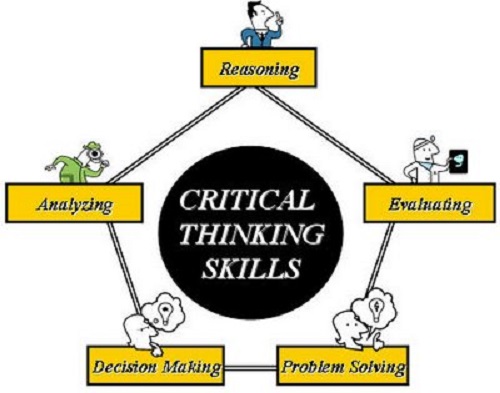Difference Between Thinking and Critical Thinking
Thinking vs. Critical Thinking
The Two Think Tanks: Thinking and Critical Thinking
Every human being is capable of thinking, but some say that few are able to practice critical thinking. What’s the difference?
Thinking is the mental process, the act and the ability to produce thoughts. People think about almost everything and anything. They often think of people, things, places, and anything without a reason or as a result of a trigger of a stimulus. Meanwhile, critical thinking often means “thinking about thinking.” In a sense, it is a deeper form of thinking about a particular issue or situation before actually deciding and acting.
In any given situation, thinking is an action that requires the person to form a thought about that situation. Any thought can be formed, even without facts or evidence. When critical thinking is applied, the mind is open to all considerations, assumptions, and details before actually forming a thought or an opinion. A person who is a critical thinker regards the subject itself and all its aspects, like the methods of collecting facts or the motivation behind said facts. A person who employs critical thinking often adds the question “why” to “who, what, where, and when” in a particular situation.
To illustrate, imagine a person at a bookstore. This person can pick out a book and think that the book is good upon first impression. A critical thinking person would open the book, read some passages, and read about the author before actually deciding whether to buy the book or not. The customer might often wonder about the title or why the author chose to write this particular piece of literature.
A thinker may accept facts or realities based on faith alone and without examination and analysis of the issue. These facts or realities are often perceived as “truth” and cannot be criticized or modified. In this situation, there is no need for evidence or the effort to produce it and its examination.
Critical thinking is the opposite of all of this. It often requires a lot of time, questions, and considerations. It also involves a longer process before arriving at a conclusion or decision.
Individuals who apply critical thinking are often open-minded and mindful of alternatives. They try to be well informed and do not jump to conclusions. Critical thinkers know and identify conclusions, reasons, and assumptions. They use clarifying and probing questions in order to formulate their reasonable situations and arguments. They often try to integrate all items in the situation and then draw conclusions with reason and caution. They also have good judgment on the credibility of sources and the quality of an argument, aside from developing and defending their stand. If asked, these people can clearly articulate their argument with all its strengths and weaknesses.
Critical thinking is an on-going process and activity. This skill is learned through active practice and constant use. Exposure to controversial issues and thought-provoking situations stimulates the mind to utilize this skill, which is then applied upon careful examination of an issue or situation. Meanwhile, thinking can be done in an instant without any given proof and/or justification.
Critical thinking requires logic and accuracy, while thinking sometimes occurs in the form of faith and personal opinion. The former requires evidence and further actions of examination and analysis, while the latter does not. It’s up to you to think and decide.
Summary:
- Both thinking and critical thinking are mental processes.
- Thinking can be classified as an action, while critical thinking can be said to be a skill.
- Critical thinking is used with caution, while thinking can be spontaneous.
- A critical thinker is able to identify the main contention in an issue, look for evidence that supports or opposes that contention, and assess the strength of the reasoning, while a thinker may base their belief solely on faith or personal opinion.
- Differences Between Fraternity And Sorority - January 8, 2014
- Differences Between Lucite and Plastic - January 7, 2014
- Differences Between Oil and Butter - January 6, 2014
Search DifferenceBetween.net :
3 Comments
Leave a Response
References :
[0]http://www.texasenterprise.utexas.edu/article/cultivating-creativity-get-out-your-own-way
[1]http://evrenozdemr.blogspot.in/2012/11/applying-critical-thinking-activities_14.html



Thank you very, much, this was a discussion question and the information was too closly related to find a significant difference.
As I was reading this article I kind of think I’m a critical thinker. When my boyfriend tells me thing about his day I’m not going to lie I try and ask why did that happen. Or I say strange that happened in order to get him to tell me more things. Just the other day we were out with our friends and Jose one of our friends was telling us how one of there friend is different ever since he got his promotion at work and Jose was like that foo needs to chill I’m not going talk about our wild nights and I was like oh yeah like which ones. I was trying to get him to talk but then our other friend pointed it out and was like umm look at Brenda thinking we really do have wild nights. I tend to always ask why is it done that way or could it have ever crossed there mind that they can do it this way.
Thx for the article,it’s very easy to understand